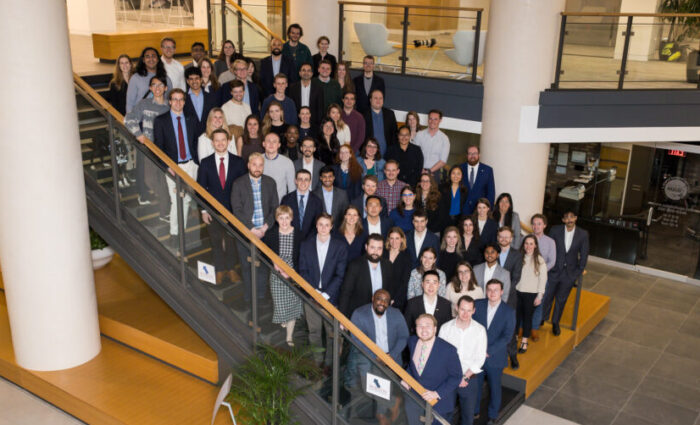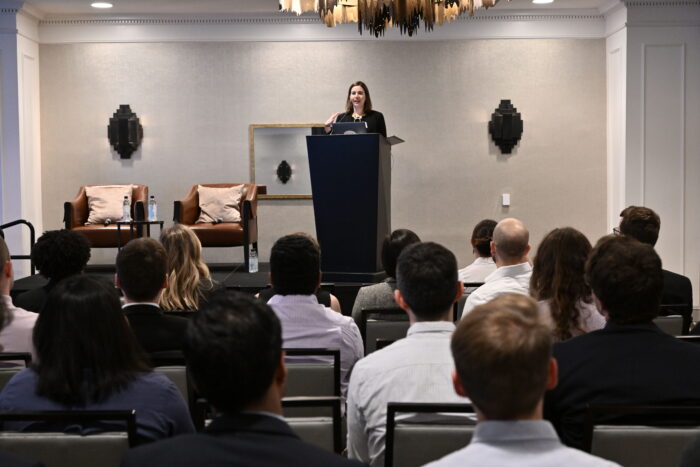
Horizon’s 2023 Year in Review
As a non-partisan non-profit, Horizon’s mission is to help the US government navigate our era of rapid technological change by fostering the next generation of public servants with emerging technology expertise.
The need for our mission has never been greater: government interest in emerging technology policy has skyrocketed over the last year even as the agencies tasked with implementing policies have struggled to find and retain people with technical expertise. In a recent hearing, Stanford professor Daniel Ho emphasized that a strong “talent pipeline … is going to be absolutely critical” for ensuring government has the people it needs to govern emerging technologies like AI. Yet many have argued that agencies lack the staff necessary to do such work; for example, the teams at National Institute of Standards and Technology working on “emerging technology and responsible [AI] only have about 20 employees.” One report found that the Federal Trade Commission “lacks the technical and institutional capacity necessary to run a full-scale AI auditing program.” Currently, less than 1% of AI PhD graduates enter government.
These workforce gaps are acutely important in light of heightened government focus on emerging technology. This past year saw the Biden Administration’s first sweeping AI executive order along with over a dozen bills aiming to regulate AI. Bio-related policy developments this year include the launch of the National Security Commission on Emerging Biotechnology and the White House Office of Pandemic Preparedness and Response Policy, as well as a new biodefense strategy from the Department of Defense. To implement these and other initiatives, the government has recognized the need for more technical talent. White House officials have described “workforce challenges” as “one of the biggest barriers” to implementing the AI EO. An analysis of the recent AI executive order found that “attracting AI talent to the federal government overwhelmingly has the greatest number of discrete requirements.”
Horizon has worked to meet this critical moment by launching new programs to help inform and encourage people from a wide array of backgrounds to consider a career in emerging technology policy; continuing our fellowship program and supporting existing fellows; and building new partnerships with other civil service organizations.
Expanding our suite of programs
This year, we’ve rolled out a new suite of programs to help prepare the next generation of public service professionals for careers in emerging technology policy.
In November, we launched emergingtechpolicy.org, a new website providing expert advice and resources for people interested in public service careers related to emerging technology policy. The information and context needed to enter policy careers is often difficult to access, especially for those not already enmeshed in the policy world. The website aims to make information about policy careers more accessible for a wide range of audiences. It includes in-depth guides, lists of existing resources, and first-person accounts from experts and policy-makers, all aimed at helping people transition into a career in policy.

In addition to emergingtechpolicy.org, we’ve piloted other ways of reaching new audiences. In April, we partnered with Brown University’s Pandemic Center to host the Game Changers Workshop, a three-day event focused on helping early- and mid-career professionals transition into careers in biosecurity policy. The workshop included talks from leading figures in the field, such as Dr. Jason Matheny, CEO of the RAND Corporation, and Dr. Steph Guerra, Assistant Director for Health Security and Biodefense at the White House Office of Science and Technology Policy.

In June, we hosted a summer webinar series on emerging technology policy careers alongside partners at the Bush School of Government and Public Service at Texas A&M University and SeedAI. Around 600 individuals signed up to participate in this webinar series, which explored how individuals from non-traditional backgrounds can transition into policy roles, why working in public service is a great way to address important emerging technology problems, and what it’s actually like to work in different types of policy and public service jobs.
We were very pleased with the amount of interest and engagement we received with both of these formats, and we plan on continuing to expand our suite of programming in 2024.
Building capacity through fellowships
In 2023, we continued our Horizon Fellowship program, through which we place fellows at host organizations to help tackle policy challenges related to artificial intelligence, biotechnology, and other emerging technologies. Fellows selected for our program receive policy-focused training, mentorship, and support in matching with a host organization for a full-time, fully funded fellowship. We received more than three times the number of applications for our fellowship program in 2023 compared to 2022, reflecting the increased demand we’re seeing from emerging technology subject matter experts who want to transition into public service. This was matched by the large number of host organizations expressing interest in hosting a fellow.

The 2023 fellowship cohort was our second cohort, and again achieved a 100% placement rate, bringing the total number of Horizon fellows and alumni up to 35. We’re proud of the work our fellows have done to contribute their expertise to a wide range of questions, working across many federal agencies, congressional offices, and think tanks.
This year, our fellows’ research included work on:
- AI standards in the EU AI Act
- The biotech R&D landscape in Russia
- The impacts and responsible use of synthetic media
- Creating auditing tools for AI equity
- Technological investments to prevent pandemics
- Technology infrastructure in Africa
- How hype over AI superintelligence could lead policy astray
- Strategic arms control after the New START Treaty
- Discerning the origin of disease outbreaks in Latin America and the Caribbean
In addition to research and analysis, our fellows have been recognized by agencies for their contributions to helping Americans access essential COVID-19 countermeasures, used dance and music to teach students about AI, talked at panels to promote policy engagement to technical audiences, helped organize congressional staff workshops on biotechnology and biosecurity issues, and delivered university guest lectures on technology policy, among many other activities. For more examples of our fellows’ work, see our prior two blog posts.
This year also saw the first tranche of fellows graduate from our program. One of our primary goals with the fellowship is to help fellows stay in public service afterward. We’re thus incredibly proud that 100% of the fellows who have fully completed our program have stayed on in policy and public service roles.
Growing our partnerships
In 2023, we also built on our partnerships and collaborations with other mission-driven organizations building pathways into public service. Our goal is to help build a healthy ecosystem with multiple potential pathways into public service to meet the government’s many talent needs, and partnering with other organizations is critical for achieving that goal.
In addition to our workshop and speaker series partnerships with SeedAI, Brown University Pandemic Center, and the Bush School at Texas A&M University, we provided support to the AAAS Science & Technology Policy Fellowship in launching their first AI-focused fellowship program. We also continue to work with TechCongress, the Aspen Tech Policy Hub, and the National Security Career and Leadership Institute to advise and train technologists exploring public service careers, through our fellowship and otherwise.
Looking forward to 2024
We are excited to build on these achievements in 2024. We aim to make emergingtechpolicy.org a primary resource for those interested in emerging technology policy careers by growing and improving its content. We plan on continuing to host workshops to closely engage with professionals at different stages in their career who may want to pivot into public service. We will also continue to pilot new programs that could help us achieve our mission, partnering with other mission-driven organizations where appropriate.
After receiving a record number of applications in our most recent application cycle, we will also be facilitating the placements of the third cohort of Horizon Fellows this coming year. They will be going through training and matching in winter and spring, and start their placements during summer 2024. By maintaining the high quality of our program and services, we aim to continue placing 100% of our fellows at host organizations and transitioning as many of our alumni into permanent policy and public service roles as possible.
If you are interested in following Horizon’s work, we encourage you to sign up for our newsletter, where we send periodic updates about our activities, applications, and the work of our fellows. If you are interested in hosting a Horizon Fellow at your institution, you can express interest here.
Lastly, we cannot function without the generous support of donors. Horizon does not accept corporate contributions, so we rely entirely on financial contributions from individuals and philanthropic organizations. There has never been a more important time to build government capacity: the US government is crucially lacking in technical expertise while technological progress and its impact on society are rapidly accelerating. Building better pipelines into public service is one of the most important ways of creating that capacity. If you are interested in supporting our mission, you can donate or reach out to us here.



